
Why Is My Vagina Dry?
Between the throbbing cramps and belly bloat, there's no denying that period pain sucks — but have you ever experienced vaginal dryness?
If you haven't, then count yourself lucky and go get a scratch-off. For everyone else — keep reading because this article is for you.
In this post, we're exploring your most beautiful organ to uncover the common causes of vaginal dryness as well as the best self-care and treatment options available.
There's quite a bit to unpack, so let's get started.
What Is Vaginal Dryness?
First things first, what exactly is vaginal dryness?
Medically known as atrophic vaginitis, vaginal dryness is a common issue that many women experience at some point or another. As well as causing pain during sex, a dry vagina might leave you feeling uncomfortable, self-conscious, and even a little embarrassed.
Common symptoms of vaginal dryness include:
- Soreness, discomfort, or itchiness in and around the vagina
- Uncomfortable or painful intercourse
- Urge to pee more often than usual
- Persistent or frequent urinary tract infections (UTIs)
- Vaginal burning or swelling around the vagina
- Tearing and light bleeding during sex
Reduced moisture in your vagina can also upset the delicate balance of vaginal flora — aka, the bacteria living inside the vagina. This can increase your risk of issues like vaginitis and bacterial vaginosis.
Some women are under the impression that vaginal dryness is just something they have to deal with, but this couldn't be further from the truth.
A dry vagina can greatly affect your quality of life and relationships, but it can be addressed.
What Is Vaginal Lubrication and Why Do We Need It?
Although most of your vaginal fluid is made primarily of water (90% or more to be exact), it contains some other essential components, such as:
- Salts — vaginal discharge is roughly 1% salts, including sodium chloride, phosphate, and calcium.
- Organic Compounds — this includes lipids, glycogen, and amino acids.
- Antibodies — the fluid in your vagina may contain antibodies that reduce the risk of some infections.
Secreted by the glands in the cervix to support a moist, slightly acidic environment in the vagina, vaginal lubrication helps maintain the perfect balance of bacteria — it also prevents infection by flushing out dead cells from the lining of the vagina, cervix, and uterus.
Depending on where you are in your cycle and what your hormone levels are, the amount of vaginal fluid you excrete could vary.
That said, it's important to keep in mind that the lubrication you experience when you're turned on is different. Activated in the Bartholin's glands right by the vaginal opening, vaginal moisture via sexual arousal helps lubricate the vagina to prevent excessive dryness and pain during penetration.
What Are the Causes of Vaginal Dryness?
Believe it or not, there are a number of things that can cause vaginal dryness — some of which may surprise you.
Perimenopause and Menopause
It's no secret that going through perimenopause and menopause can trigger a number of changes to a woman's body, but did you know that vaginal dryness is among the most common symptoms for women during this sensitive time?
As a woman reaches perimenopause, her body's natural estrogen production begins to take a nosedive, and this continues throughout menopause. The lack of sex hormones can make the vaginal lining thinner and lead to — you guessed it — a dry vagina.
Childbirth and Breastfeeding
Recently discovered you've got a bun in the oven? Thanks to a major dip in the hormone oestrogen, pregnancy is one of the biggest culprits behind vaginal dryness.
Your libido may also fluctuate throughout your pregnancy which can affect the degree of vaginal lubrication as well — no need to worry, though, as this is perfectly normal and will pass.
That said, if you plan on breastfeeding after bringing your little one into the world, you may continue to experience vaginal dryness. This is because breastfeeding changes hormone levels in your body, and some women can experience changes in their nether regions as a result.
Birth Control
Generally speaking, anything that impacts your hormones can cause some degree of vaginal dryness — hormonal contraception, like the birth control pill, shot, or hormonal ring, is no exception.
This is because the body's production of progesterone and estrogen, which play a key role in vaginal lubrication, is replaced by synthetic hormones via hormonal contraception.
You see, the synthetic hormones commonly found in hormonal contraception aren't the same as the hormones that your body makes naturally. So, as a result, they may cause changes in your progesterone or estrogen levels that can lead to less moisture downstairs.
Lack of Sexual Arousal
If you're feeling especially dry during sex, it may be that you have a difficult time getting aroused. A lack of sexual arousal can stem from many different things, such as not having enough foreplay, relationship woes, and hormonal imbalances.
To help make your time in the sheets a little more enjoyable and a little less dry, we recommend using a water-based lube — like Sex Stuff. Super slippery and hydrating, this gentle personal lubricant is pH balanced to match and maintain the vagina's flora and good bacteria.*
Medications
Does your vaginal dryness coincide with starting a new med? If so, there just might be some cause-and-effect going on.
More often than not, medications that typically cause your eyes, mouth, or skin to feel dry can also cause dryness below the belt. Common meds that may contribute to vaginal dryness include:
- Antihistamines or cold medications (ex: Benadryl)
- Breast cancer drugs (ex: Letrozole)
- Asthma medications
- Certain antidepressants
- Accutane
If you suspect one of your medications to be the culprit of your vaginal dryness, consult your doctor to see what can be done.
Over Washing
Although it might be tempting to douche your vagina — don't. Why? Believe it or not, the vagina is a self-cleaning organ that is fully capable of keeping itself fresh.
Sure, douching may leave you feeling squeaky clean, but it's not necessary for a healthy vaginal pH balance. In fact, douching may actually disrupt this delicate balance, which can quickly lead to vaginal dryness and irritation.
If you need to freshen up, say no to douching and yes to our Mini Do It All Wipes; pH balancing, OB/GYN-recommended, and oh-so-soft — what's not to love?*
Sjögren's Syndrome
Another possible cause of vaginal dryness is Sjögren's syndrome— a rare autoimmune disease that causes chronic inflammation in the body's secretion-producing glands. This inflammation can throw a wrench in secretion production, potentially resulting in a dry mouth, dry eyes, and a dry vagina.
What Helps With Vaginal Dryness?
If you're struggling with vaginal dryness, there may be ways to remedy it. Here are a few tips you can try that may help:
- Hormone replacement therapy (HRT)
- Staying hydrated
- Keeping the vulva clean (this is the outside of the vagina — not the inside)
- Engaging in foreplay
- Estrogen therapy
- Vaginal moisturizers
- Prescription medications
If your vaginal dryness lingers despite proactive home treatment, or doctor-recommended remedies, it's a good idea to get checked out again by a gynecologist or your primary care provider.
A doctor can rule out any underlying medical conditions, provide stronger treatment, or give you alternative treatment methods.
A Final Word
Vaginal dryness is a common and frustrating issue that just about every woman may experience at some point in their life. Whether due to over-washing, menopause, or a lack of sexual arousal, a dry vagina can be especially painful and uncomfortable — particularly during sex.
Thankfully, vaginal dryness is usually nothing too serious and can typically be remedied with a little lube, more foreplay, or a change in medications.
That said, if the condition negatively affects your lifestyle and is wreaking havoc on your sex life and relationship(s), consider making an appointment with your doctor. Living with an uncomfortably dry vagina doesn’t have to be a part of your life — in other words, there are treatments available.
Here at Love Wellness, we create natural solutions for natural problems because, just like you, we experience them too. Check us out today to discover clean products that fit your unique body’s needs and remember — whether you’re dealing with vaginal dryness, questionable odors, or a weird discharge, you’re never alone when you’re with us.
Sources:
Experiencing Vaginal Dryness? Here's What You Need to Know | ACOG
Shop Our Founder's Favorites Wellness Products
-
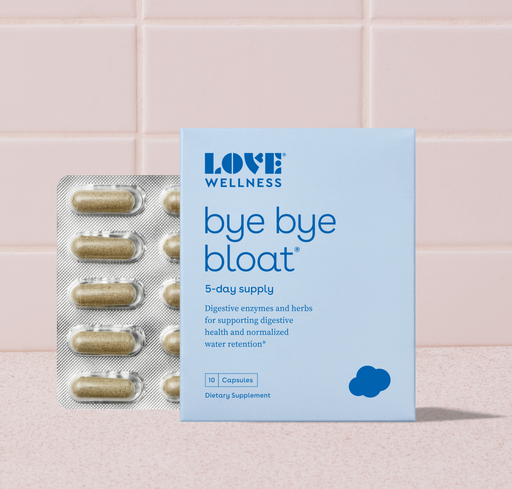 NEW!
NEW!Bye Bye Bloat® Travel Size
Alleviates bloating fast*
$8.99 One-time PurchaseA blend of digestive enzymes and herbs that alleviates bloating fast.* - Gluten-Free & Dairy-Free - Take 1-2 capsules after a meal or before b...
View full details -
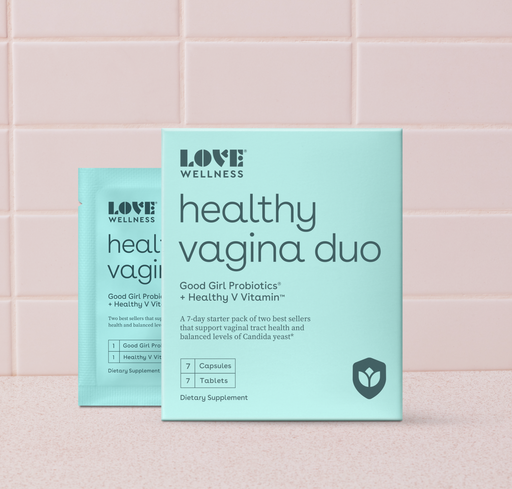 NEW!
NEW!Healthy Vagina Travel Kit
Supports vaginal & urinary tract health*
$16.99 One-time Purchase- 7-day supply — perfectly sized to take on the go so you can keep your routine up when you’re not at home! - Good Girl Probiotics®: Helps to maint...
View full details -
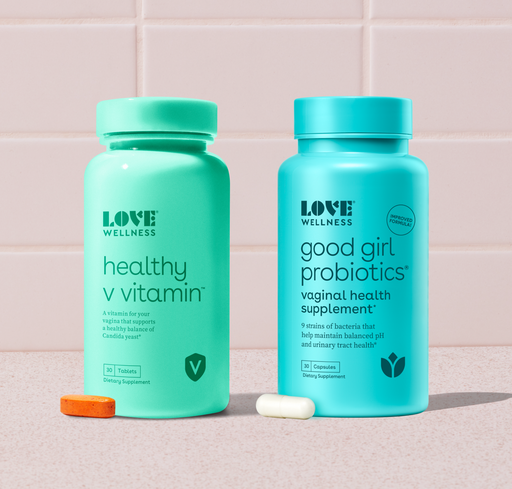

Healthy Vagina Bundle
Supports vaginal & urinary tract health*
$35.24 Subscribe & Save$46.99 One-time PurchaseFor vaginal & urinary tract health. HOW IT WORKS Together, this powerful duo supports your vaginal health by balancing bacteria and yeast. Go...
View full details -
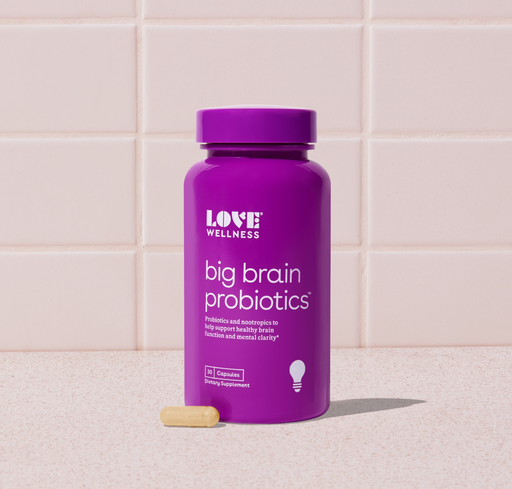
Big Brain Probiotics®
Helps support brain function*
$22.49 Subscribe & Save$29.99 One-time PurchaseA blend of probiotics and nootropics to help support brain function, cognitive health, and help maintain a healthy mood and sense of calm.* - Vegan...
View full details -
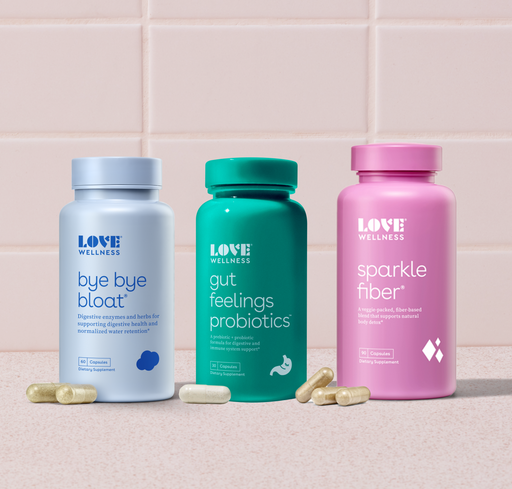

Bloating Bundle
Helps boost your gut health*
$54.74 Subscribe & Save$72.99 One-time PurchaseBeat bloat with this combo of fiber, digestive enzymes, and probiotics that naturally boost your gut health.* gut, bloating, gas, reflux, probiot...
View full details -
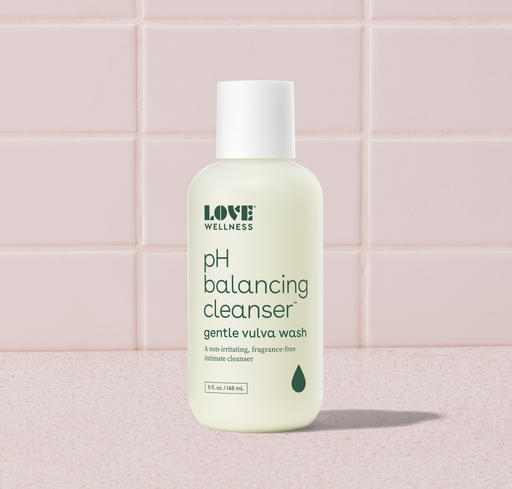
pH Balancing Cleanser™
Gently cleanses your vulva
$11.24 Subscribe & Save$14.99 One-time PurchaseA fragrance-free, gentle cleanser for your vulva to help maintain a balanced vaginal microbiome. - Gluten-Free, Dairy-Free, Vegan - Apply to wet s...
View full details -
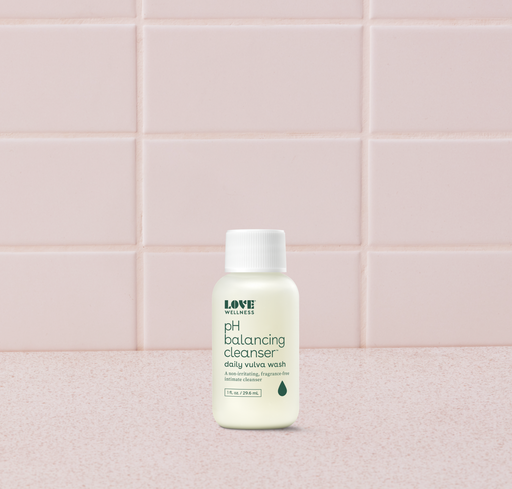 NEW!
NEW!pH Balancing Cleanser™ Travel Size
Gently cleanses your vulva
$4.99 One-time PurchaseA fragrance-free, gentle cleanser for your vulva to help maintain a balanced vaginal microbiome. - Gluten-Free, Dairy-Free, Vegan - Apply to wet s...
View full details -
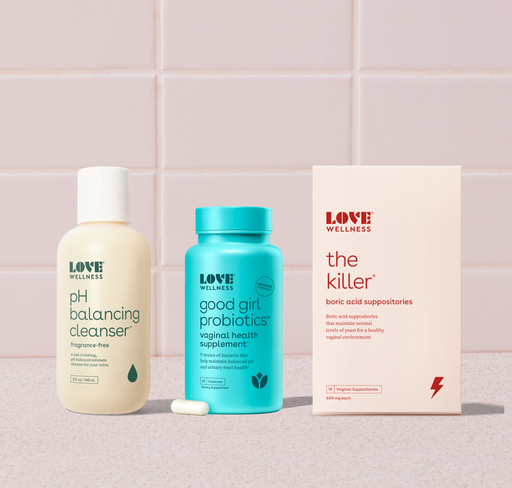

Vaginal pH Bundle
Three, must-have products to keep your pH balanced.
$40.49 Subscribe & Save$53.99 One-time PurchaseThree, must-have products to keep your pH balanced: a daily vaginal probiotic, a fast-acting suppository, and a fragrance-free vulva cleanser.*








